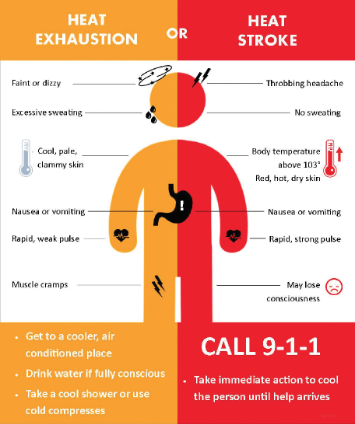For most of us, no matter where we live, this time of year means heat — lots of heat. Just last week in Minnesota (where it was 50 degrees below zero in January), we had consecutive days with heat indexes over 100 degrees. While we may feel some discomfort at home, the excessive heat outside poses real life-threatening risks to our employees, program participants and members.
While many of us can tell when we get too hot, the majority of us also miss critical warning signs our bodies send to us. During extremely hot and humid weather, your body’s ability to cool itself is challenged.
When the body heats too rapidly to cool itself properly, or when too much fluid or salt is lost through dehydration or sweating, body temperature rises and the individual may experience a heat-related illness.
It’s important to know the symptoms of excessive heat exposure and the appropriate responses:
Now that you know what signs to look for, how can you prepare ahead of time? Take careful precautions when you see or hear these key phrases:
Excessive heat warning — take action! An excessive heat warning is issued within 12 hours of the onset of extremely dangerous heat conditions. The general rule of thumb for this warning is when the maximum heat index temperature is expected to be 105 degrees or higher for at least two days, and night time air temperatures will not drop below 75 degrees — however, these criteria vary across the country, especially for areas not used to extreme heat conditions. If you don’t take precautions immediately when conditions are extreme, you may become seriously ill or even die.
Excessive heat watches — be prepared! Heat watches are issued when conditions are favorable for an excessive heat event in the next 24 to 72 hours. A watch is used when the risk of a heat wave has increased but its occurrence and timing is still uncertain.
The Center for Disease Control (CDC) has great tips for staying safe in extreme heat:
Stay Cool
Wear appropriate clothing. Choose lightweight, light-colored, loose-fitting clothing.
Stay cool indoors. Stay in an air-conditioned place as much as possible. If your home does not have air conditioning, go to the shopping mall or public library — even a few hours spent in air conditioning can help your body stay cooler when you go back into the heat. Call your local health department to see if there are any heat-relief shelters in your area.
Keep in mind electric fans may provide comfort, but when the temperature is in the high 90s, they will not prevent heat-related illness. Taking a cool shower or bath, or moving to an air-conditioned place is a much better way to cool off. Use your stove and oven less to maintain a cooler temperature in your home.
Schedule outdoor activities carefully. Try to limit your outdoor activity to when it’s coolest, like morning and evening hours. Rest often in shady areas so your body has a chance to recover.
Pace yourself. Cut down on exercise during the heat. If you’re not accustomed to working or exercising in a hot environment, start slowly and pick up the pace gradually. If exertion in the heat makes your heart pound and leaves you gasping for breath, stop all activity. Get into a cool area or into the shade, and rest, especially if you become lightheaded, confused, weak or faint.
Wear sunscreen. Sunburn affects your body’s ability to cool down and can make you dehydrated. If you must go outdoors, protect yourself from the sun by wearing a wide-brimmed hat and sunglasses, and putting on sunscreen of SPF 15 or higher, 30 minutes prior to going out. Continue to reapply it according to the package directions.
Avoid hot and heavy meals. They add heat to your body!
Stay Hydrated
Drink plenty of fluids. Drink more fluids, regardless of how active you are. Don’t wait until you’re thirsty to drink.
- If your doctor limits the amount you drink or has you on water pills, ask how much you should drink while the weather is hot.
- Stay away from very sugary or alcoholic drinks. These actually cause you to lose more body fluid. Also avoid very cold drinks, because they can cause stomach cramps.
Replace salt and minerals. Heavy sweating removes salt and minerals from the body that need to be replaced. A sports drink can replace the salt and minerals you lose in sweat.
If you are on a low-salt diet, have diabetes, high blood pressure, or other chronic conditions, talk with your doctor before drinking a sports beverage or taking salt tablets.
Keep your pets hydrated. Provide plenty of fresh water for your pets, and leave the water in a shady area.
Stay Informed
Check for updates. Check your local news for extreme heat alerts and safety tips, and to learn about any cooling shelters in your area.
Know the signs. Learn the signs and symptoms of heat-related illnesses, and how to treat them.
Use a buddy system. When working in the heat, monitor the condition of your co-workers and have someone do the same for you. Heat-induced illness can cause a person to become confused or lose consciousness. If you are 65-years-old or older, have a friend or relative call to check on you twice a day during a heat wave. If you know someone in this age group, check on them at least twice a day.
Monitor those at high risk: Although anyone at any time can suffer from heat-related illness, some people are at greater risk than others:
- Infants and young children.
- People 65 years of age or older.
- People who are overweight.
- People who overexert during work or exercise.
- People who are physically ill, especially with heart disease or high blood pressure, or who take certain medications, such as for depression, insomnia or poor circulation.
As the summer winds down, let’s all be sure to pay close attention to heat warnings, keep an eye out for those at high risk, and follow the CDC’s tips to stay cool, stay hydrated and stay informed.
Courtney Harrness is a multi-site executive director for the YMCA of the Greater Twin Cities.











